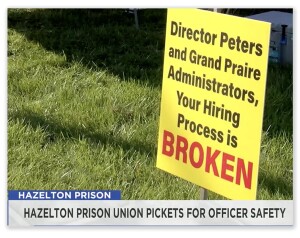We post news and comment on federal criminal justice issues, focused primarily on trial and post-conviction matters, legislative initiatives, and sentencing issues.

BOP EMPLOYEES TAKE IT ON THE CHIN (AGAIN)
Last Monday, 23,000 BOP employees lost their retention bonuses, reducing their pay by up to 25%. Last Thursday, President Trump stripped the prison workers, along with thousands of other federal employees, of the right of collective bargaining.
 As Walter Pavlo described it in Forbes last week, “Despite already ranking last among federal agencies in employee satisfaction, morale [at the BOP] has worsened. President Trump’s recent aims to eliminate BOP employees’ ability to unionize [is] a move condemned by AFGE Council 33 President Everett Kelley as a “disgraceful and retaliatory attack” on civil servants.
As Walter Pavlo described it in Forbes last week, “Despite already ranking last among federal agencies in employee satisfaction, morale [at the BOP] has worsened. President Trump’s recent aims to eliminate BOP employees’ ability to unionize [is] a move condemned by AFGE Council 33 President Everett Kelley as a “disgraceful and retaliatory attack” on civil servants.
The Marshall Project (TMP) reported yesterday that “[l]abor leaders say the move is devastating for the Bureau, and silences a union representing over 30,000 people at more than 120 federal prisons nationwide. It’s the latest and biggest hit to a workforce that includes many supporters of Trump’s ‘tough on crime’ campaign rhetoric.”

There is little doubt that loss of collective bargaining clout and union protection for BOP employees facing disciplinary action for misconduct “will exacerbate an ongoing staffing crisis,” as TMP put it. The union “has consistently sounded the alarm on the chronic staffing shortages in the federal prison system,” David Fathi, director of the American Civil Liberties Union National Prison Project, told TMP. While there are cases where the union has “frustrated and undermined accountability,” Fathi said, “we have frequently seen prison staff unions align themselves with incarcerated people to press for safer conditions.”
“People are still in shock,” said Brandy Moore White, national president of the Council of Prison Locals. “I think a lot of people felt secure in the fact that while we are a union, we are a law enforcement union, and we do work with both sides,” referring to Republicans and Democrats.
Compounding this frustration, the Department of Government Efficiency (DOGE) has reportedly pressured staff to resign, while long hours and severe shortages persist. The likelihood of mass resignations only increases instability within the agency.”
Executive Order, Exclusions From Federal Labor-Management Relations Programs (March 27, 2025)
Forbes, Bureau of Prisons Is ‘Rudderless’ Operation, Says Former Director (March 28, 2025)
The Marshall Project, Trump’s Union Order Endangers Federal Prison Officers, Labor Leaders Say (March 31, 2025)
– Thomas L. Root

